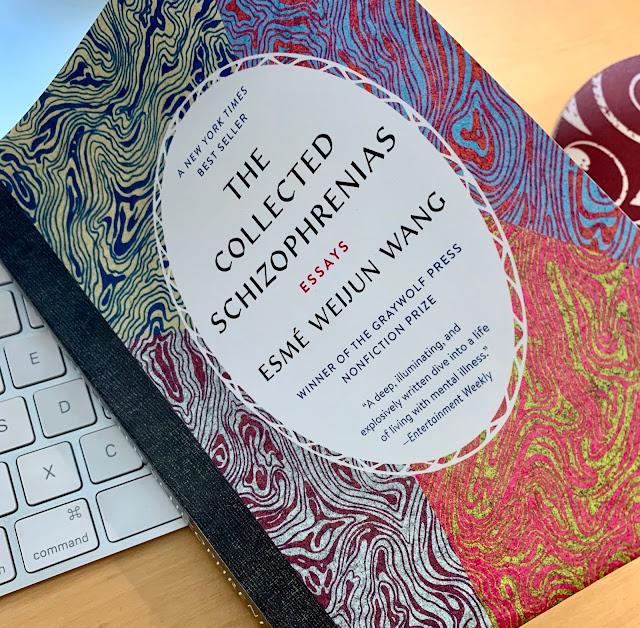"The Collected Schizophrenias: Essays" by Esmé Weijun Wang (published 2019)
"Though nearly all statements a psychiatric patient can make are not believed, proclamations of insanity are the exception to the rule."
To read "The Collected Schizophrenias: Essays" by Esmé Weijun Wang, you must be committed. I say this not to dissuade you, but more to prepare you for the type of book that it is: Wang's writing is decidedly dispassionate and the words less poetic in that flowery way than some may be looking for. However, that is precisely why I loved the book. Moreover, this style (which includes sharp handed, gorgeous prose, I might add) does not take away from the fact that "The Collected Schizophrenias" is for all those deeply committed to raising awareness about mental illness, indeed, mental health, under power structures (such as pharmaceutical industries and hospitals generally) that are imbalanced, difficult to decipher precisely because we all know that the trustworthy and untrustworthy are simultaneously engaged in those professions (medical or otherwise).
In an oft repeated scene in books and movies, I still find it comforting to hear that someone else has shared my experience of being in a ward:
"Sometimes, someone will be allowed to bring something you cherish to you during visiting hours, although this must take place after a nurse inspects the goods; a lot of the time, your possessions won't be permitted into the ward because they include a sharp point or a wire coil or a dangerous piece of cloth. You're not allowed to choose what you eat, and within the limited choices that do exist, you're forced to choose only between things that are disgusting. You are told when to sleep and when to wake up. If you spend too much time in your bedroom, it indicates that you're being antisocial; if you do sit in the common areas but don't interact with the other patients, you're probably depressed or overly inward or perhaps even catatonic. Humans might all be ciphers to one another, but people with mental illness are particularly opaque because of their broken brains. We cannot be trusted about anything, including our own experiences." (italics mine)
For me, what is so powerful about Wang's book of essays regarding her illness is that she is clearly and fearlessly navigating rarely charted territory, avoiding the brutal storms (that could've turned into the worst kind of romanticism - that of the fetishized psychopath or else a kind of joyous spiritualism without politics) with a steady pen at the helm.
As a person who has been diagnosed with psychosis, and later the more specific, schizoaffective depressive type of psychosis, myself, I can say this: in the midst of the illness especially, this specific thread gives one the *ability to become dispassionate* (even if, indeed *especially* if, one was not known to be dispassionate before). What happens in serious cases, from my own experience, in a particularly bad episode, the subject will try everything in his or her power to *reason with* the completely unreasonable situation at hand - the subject becomes hyper-objective due to an extreme loss of reality.
Let's be clear here. One example Wang gives is very simple. She's showering. All of a sudden, she hears someone say: "I hate you." What does she do? First, she checks if she can hear an echo from the drain. Then she ponders whether or not it was someone speaking loudly from the apartment upstairs. Then she asks, nonchalantly, whether her roommate heard anyone talking. Only after all these outlets of reality are denied, can she begin to question, well, her sanity.
I've tried to write about my own visual and auditory hallucinations myself, and I can vouch for how hard it is to do so. Even in writing it it seems unbelievable, and precisely because, ironically, all imagination has been stripped away. It is as if imagination itself, in the throes of an episode, has been denied you, and you are left to wonder how anything can be objectively understood while also knowing that it absolutely cannot be understood that way.
Like me, Wang, despite everything, leaves room for *play*. Because why not enjoy the elements of fashion when everything else has gone to shit?
"If schizophrenia is the domain of the slovenly, I stand outside of its boundaries as a straight-backed ingenue, and there is no telltale smearing beyond the borders of my mouth."
This book might be a must-read for you if you are interested in: 1) the in and outs of hospitalization for patients with mental illness, 2) the current names of medicinal prescriptions and their application for those dealing with schizophrenia and related symptoms, 3) short, powerful examples of psychotic episodes that don't fall into the realm of Hithcock's "Psycho", 4) the creativity that mental illness leaves in its aftermath, 5) the subtle politics of how to engage with someone who has a form of schizophrenia, and 6) how mental illness is absolutely not exclusive from other sicknesses that emerge within the body (Wang, in addition to schizophrenia, has Lyme disease).
Some of my favorite parts of "The Collected Schizophrenias" are found in the last essays of the book, where I see, and relate, to how Wang comes to terms with her illness (which, I'd like to think, is a form a healing) through engagement with different religious rituals from various traditions as well as more pagan and supernatural traditions. Recovering from episodes and past experiences with the schizophrenias includes being able to grapple with past events with a sincere, genuine, *authentic* use and production of fantasy (as an aesthetic and practice) and other forms of creativity. Wang's usage of her newfound coping mechanisms (the reverse of this: supernatural powers) seems to be extremely pragmatic, and I'd do well to learn from that, and intend to. See her gorgeous blog: https://esmewang.com (which will be my home, among one or two more regular places, that I consistently visit online and consider as such).
Note to self: a particular paragraph that fascinated me within the pages of the book was regarding the word "asylum". A future project for me may be to write extensively about this word, its etymology, its use and meaning... I'm sure I'll have to look up some M. Foucault. I'll end here with Wang's comprehensive take:
"An 'asylum' is a 'place of haven or safety' (The Oxford English Dictionary), though the antiquated word, when applied to psychiatric hospitals, in now used to conjure fear. In the book Haunted Asylums: Stories of the Damned; Inside the Haunted Prisons, Wards, and Crazy Houses, paranormal enthusiast Roger P. Mills claims that mental hospitals "are among the most haunted places on the planet." The second season of the FX horror series American Horror Story, called 'Asylum', places a mishmash of murderes, a secret Nazi, rape, and grotesque scientific experiments with the walls of its fictional sanitarium, Briarcliff Manor. The Elizabeth Arkham Asylum for the Criminally Insane confines , at least temporarily, the worst villains of Batman lore. The word 'asylum' triggers cultural associations, à la One Flew Over the Cuckoo's Nest, with frightening and brutal treatment of psychiatric patients. And yet I suspect that what's truly scary about the word has more to do with the inefficacy to of psychiatric treatment from that era, which did little to rein in its patients' most disturbing behaviors, including those that were inexplicable, dangerous, or violent."




Comments
Post a Comment